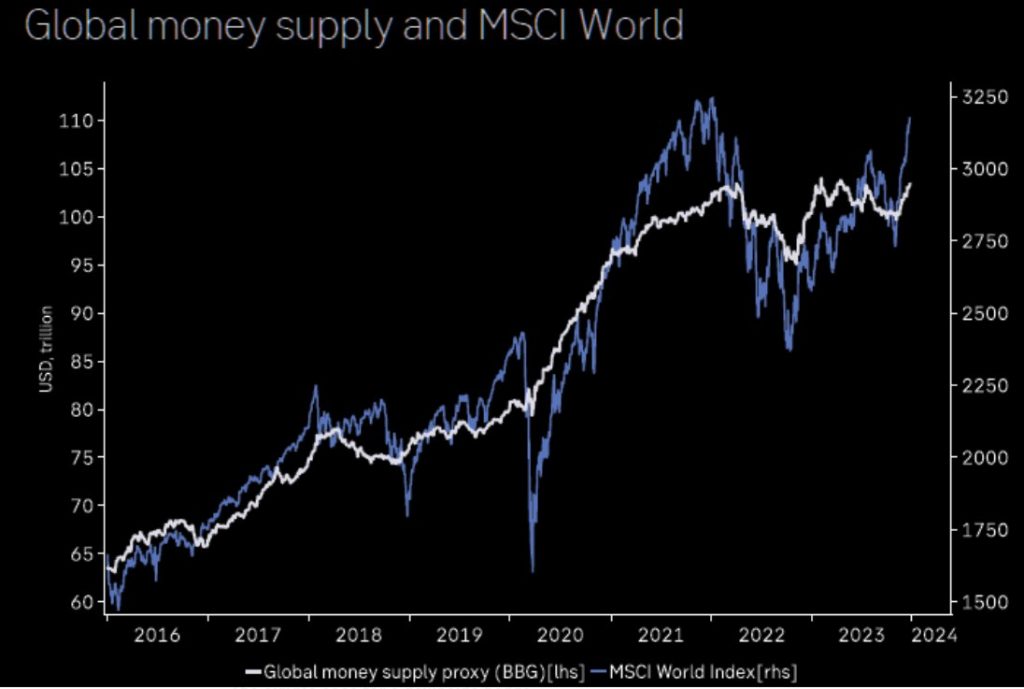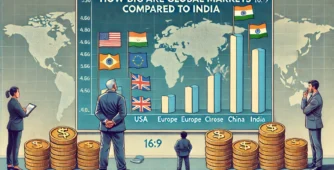In this blog, we would like to highlight the correlation between the global money supply and asset inflation. The below enclosed chart demonstrates how the MSCI World Index, a representative of global equities, has closely followed the trajectory of the global money supply over the past eight years. This correlation suggests that while asset prices are rising, the world may not be making significant progress. We will delve deeper into this topic and explore the implications of this correlation.
The chart showcases the global money supply plotted against the MSCI World Index. The white line represents the global money supply, sourced from Bloomberg, while the MSCI World Index is plotted on the right-hand side y-axis. Over the past eight years, the MSCI World Index has shown a consistent upward trend in line with the growth of the global money supply.

It is evident that an increase in the global money supply leads to asset inflation across the board. As more money enters the market, prices of various assets rise, making individuals feel wealthier. For example, a commodity that was priced at $10 a few years ago might now be valued at $20. This apparent increase in wealth gives the perception of progress. However, when analyzed through the lens of the chart, it becomes clear that this correlation does not necessarily indicate substantial growth or change in the world.
While asset prices continue to rise, earnings growth has either stalled or is growing very slowly. The price-earnings ratios steadily increase as asset prices surge, indicating that the market is becoming overvalued. In the past, markets would oscillate between price-earnings ratios of twelve to eighteen. However, in recent years, a paradigm shift has occurred, with higher price-earnings ratios becoming the new norm. For instance, the S&P 500, which historically had a long-term average price-earnings ratio below 20, now sits near 30.
In India, the situation is no different, with forward price-earnings ratios fluctuating between 20 and 30. Even during extreme market downturns, these ratios rarely dip below 17 or 18. This shift in benchmarks often goes unnoticed by many investors, who continue to apply outdated valuation metrics and lament the perceived lack of cheap stocks. However, it is essential to recognize that as the money supply continues to grow rapidly, asset prices are significantly impacted, making them appear more expensive.
As the world experiences this shift in benchmarks, it is crucial to question the validity of relying on outdated valuation parameters. Much like how medical benchmarks for blood pressure or blood sugar have evolved, economic benchmarks also require reevaluation. The presenter contends that industry pressure established previous benchmarks, but they may no longer accurately reflect market conditions. With the constant influx of new money into the system, asset prices are unlikely to decrease significantly unless external economic factors, such as wars or civil rights issues, lead to destruction.
The prevailing economic regime appears to involve continuously pumping money into the system, resulting in invisible inflation. This approach aims to create a sense of rising portfolios and asset prices, fostering the perception of progress and wealth accumulation. However, when considering the correlation between the global money supply and asset inflation, genuine progress may be harder to ascertain. While individuals may feel wealthier due to rising asset prices, this may be a consequence of inflation rather than substantial economic growth.

If you have any questions, please write to support@weekendinvesting.com










You are on fire Alok. Amazing content as usual. I cant agree more on the matrix of money illusion
Thank you Sir